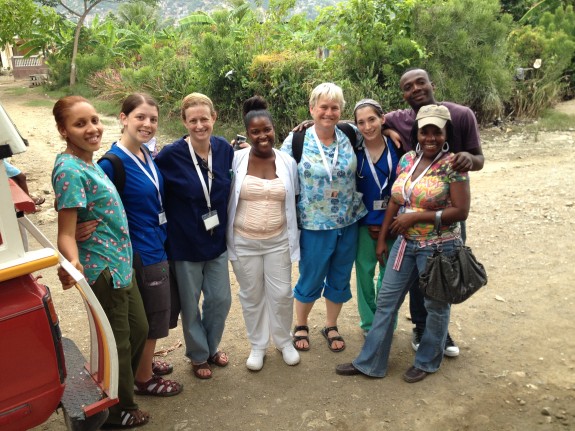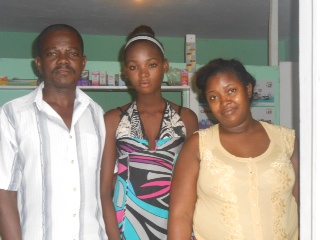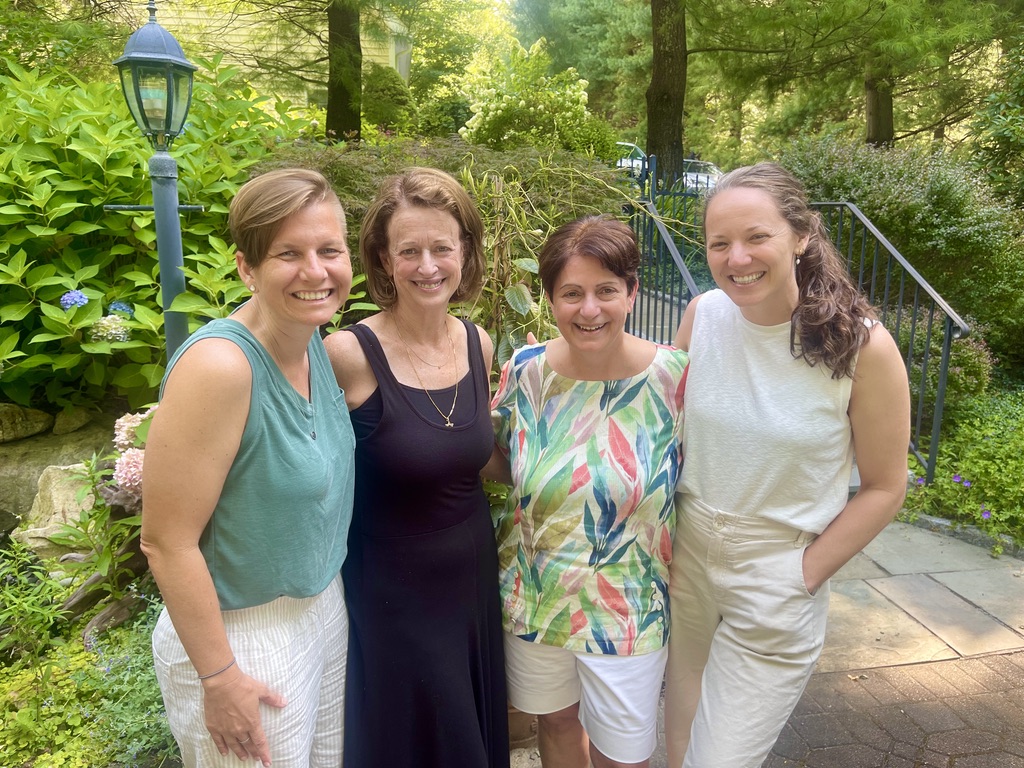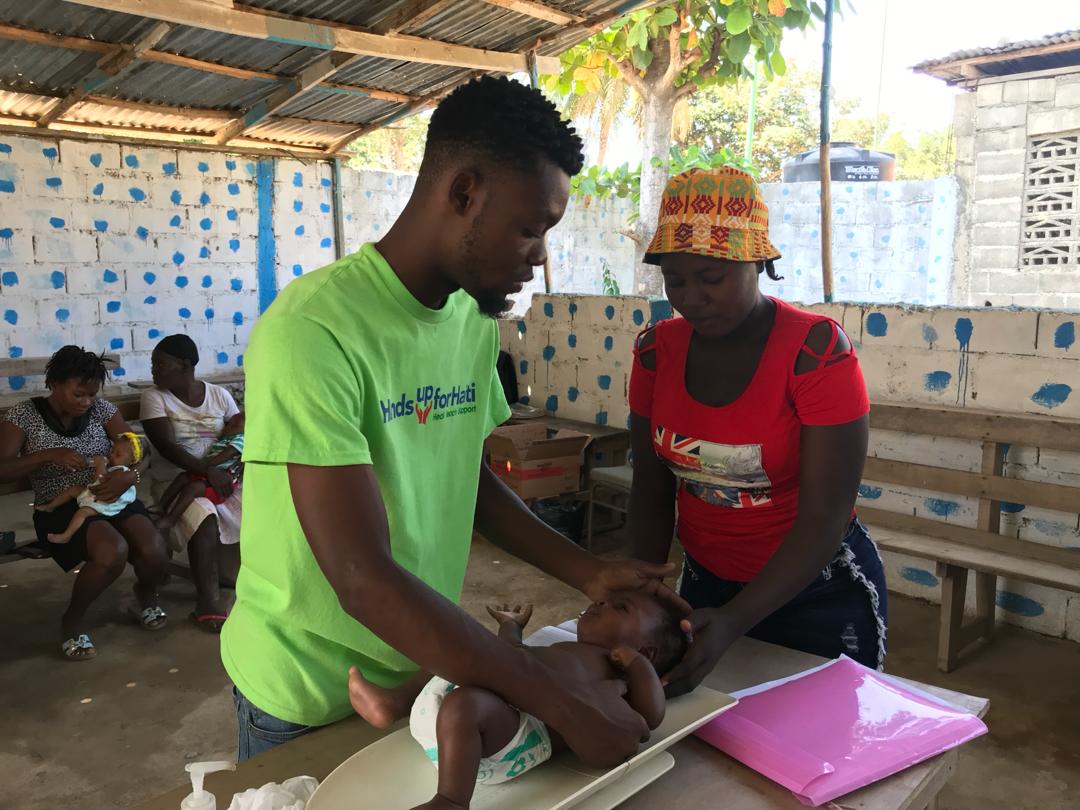She walked into the busy clinic, a thin, quiet teenage girl who seemed frightened and reserved. Her name was Jennie and she had been brought to the clinic by her adoptive mother who heard that a Hands Up for Haiti team would be visiting the small clinic known as Shaddai in the area of Cap Haitien known as Blue Hills.
Our small group of doctors and nurses had never been to this clinic before and we were busy seeing patients, of all ages, when the nurse brought Jennie and her mother over to see me. She explained to me through our translators, that over the last several weeks, Jennie had become more withdrawn and was seeing things. She would wake up from her sleep shouting and disoriented. Other times she would be unable to speak, or run into the streets unclothed. Her mother informed me that she had been an abandoned child that she and her husband had taken in.
Many children in Haiti are abandoned when their family sees no way to feed and clothe them, or provide the medical care they need, They do this in hopes of someone caring for them. And often, despite such wide spread poverty, another family does take them in and will do their best to care for the child in need. This was Jennie’s story. There was some information that Jennie’s natural mother had had mental illness. Jennie had been fine until five weeks ago when the bizarre behavior occurred.

Nurse Chancerrie welcomes the team to the Shadii clinic
It was the first time that a Hands Up for Haiti team had come to work at the Shaddai Clinic. I met the nurse, Channecie Gabelius at the Cap Haitien Health Network meeting in October of 2013. She told me about the clinic that she and her husband, a Pastor ran in a community of Cap Haitien called Blue Hills. She was hoping that a team from Hands Up for Haiti would come and work with her at her clinic.
Following the meeting our medical director, Dr. Dieula Toussaint was able to make arrangements for a site visit. Based on Dieula’s visit, we were able to discern that the clinic was a small facility operating out of Channecie’s home. Dieula recommended that our team be limited to five people.
So given that this would be the first visit for a HUFH team at this location, Dieula and I went as the doctors, bringing Amy Welsh, a Canadian nursing student, Celine Grae, an American EMT and Marg Nap, an experienced Canadian nurse. We arrived at the clinic after being escorted from the center of the town to a small road to a crowd assembled outside of a house with a veranda. The crowd consisted of small children, and elderly adults, and everything in between. Dieula and I set up two stations in the living room, Marg was set up on the veranda in a small enclosed area to triage patients, and Celine and Amy set up our supplies and pharmacy. Our team included our two translators, Peterson, and Sandra.

(L-R)Dr. Dieula Touissant, EMT Celine Grae, Dr. Jill Ratner, Nurses Channecie Gabelius of Blue Hills and Marg Nap from Canada, Nursing Student Amy Walsh, Translators Simon Peterson and Sondra
I sat on a couch with a small wooden table in front of me- and despite the rush of children who needed to be seen, I knew that Jennie needed to be my first priority. Psychiatric care in Haiti is sporadic at best and very difficult to find for most families in need. My instinct told me this was a child who had experienced trauma in her life, might have a predisposition for mental illness, and her family had witnessed an abrupt decline in her functioning. In the US this would have called for a full neurologic evaluation, blood tests, CAT scan and EEG, which more than likely would be normal and she would be seen by a Psychiatrist.
But here I was in a living room in Haiti, with my translator and a mother, and a desperate teenager. She clearly understood everything I said to her, although she could not speak, she nodded and let me know how she was feeling. The best I could do on that day was be kind and reassuring, treat her for infections that might cause encephalopathy, and think about how I could get her for diagnostic and therapeutic treatment. The family was so appreciative of us being caring and kind. We took their contact information and I left feeling helpless to aid this girl for whom reality and hallucinations were indistinguishable.
After that day, Josette , a family practitioner on the trip, and I discussed this girl. Josette, having more of a psychiatric background from her practice, felt strongly that Jennie was having a first psychotic break, and could be helped by medication. I contacted Ted Kaplan, the head of the Cap Haitien Health Network, and he was able to refer me to a team who comes twice a year to Ounaminthe to teach local doctors how to treat psychiatric disorders and sees patients. They were returning in three weeks! Ounaminthe is about an hour’s drive from Blue Hills.
I was able to contact Dr. Jim Druckenbrod back in the United States and Chaneccie brought Jennie to see him with funds provided by HUFH. She was evaluated and begun on life changing medication. Channecie writes to me regularly to let me know of her progress., “Jennie is so much better! Her family says she is eating and drinking normally and seems more like herself. Merci Dr. Jill, Parents of Jennie embrace you. “According to the reports, Jennie speaks, is no longer tortured by hallucinations and has returned to normal activities and school.

Jennie and her parents return to the clinic.
What is more the team led by Dr. Jim Druckenbrod is sharing their clinical protocols with us and is interested in collaborating in any way possible. This means that subsequent patients can benefit, and that we, and our Haitian colleagues can feel more comfortable treating a broader range of conditions.
We will return to Blue Hills and I will hug Channecie and see Jennie again on my next trip. I didn’t do much for Jennie except listen, empathize and find someone and someway to help her. These little victories and successes are the true delights of being a physician and working together to be able to coordinate care with other dedicated individuals and organizations. Without contacts, and relationships, none of this would happen. Hands Up for Haiti and its association with the Cap Haitien Health Network made this girl’s future optimistic again.
Dr. Jill Ratner


